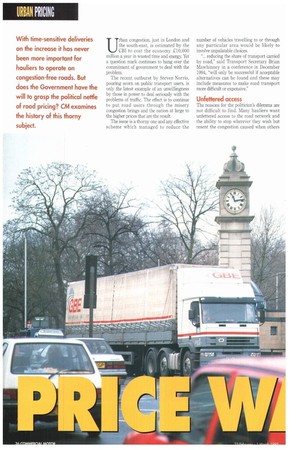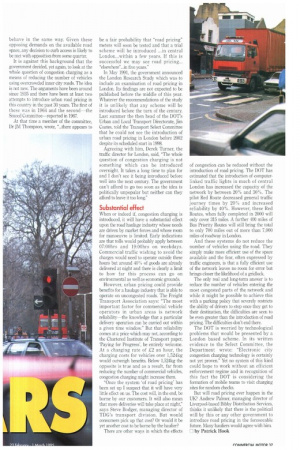U rban congestion, just in London and the south-east, is estimated
Page 38

Page 39

If you've noticed an error in this article please click here to report it so we can fix it.
by the CBI to cost the economy £10000 million a year in wasted time and energy. Yet a question mark continues to hang over the commitment of government to deal with the problem.
The recent outburst by Steven Norris, pouring scorn on public transport users, is only the latest example of an unwillingness by those in power to deal seriously with the problems of traffic. The effect is to continue to put road users through the misery congestion brings and the nation at large to the higher prices that are the result.
The issue is a thorny one and any effective scheme which managed to reduce the number of vehicles travelling to or through any particular area would be likely to involve unpalatable choices.
"... reducing the share of transport carried by road," said Transport Secretary Brian Mawhinney in a conference in December 1994, will only be successful if acceptable alternatives can be found and these may include measures to make road transport more difficult or expensive."
Unfettered access
The reasons for the politician's dilemma are not difficult to find. Many hauliers want unfettered access to the road network and the ability to stop wherever they wish but resent the congestion caused when others behave in the same way. Given these opposing demands on the available road space, any decision to curb access is likely to be met with opposition from some quarter.
It is against this background that the government decided, yet again, to look at the whole question of congestion charging as a means of reducing the number of vehicles using overcrowded inner city roads. The idea is not new. The arguments have been around since 1935 and there have been at least two attempts to introduce urban road pricing in this country in the past 30 years. The first of these was in 1964 and the second—the Smeed Committee—reported in 1967.
At that time a member of the committee, Dr JIM Thompson, wrote, "...there appears to be a fair probability that "road pricing" meters will soon be tested and that a trial scheme will be introduced ...in central London...within a few years. If this is successful we may see road pricing... "elsewhere".., in five years."
In May 1991, the government announced the London Research Study which was to include an examination of road pricing in London. Its findings are not expected to be published before the middle of this year. Whatever the recommendations of the study it is unlikely that any scheme will be introduced before the turn of the century. Last summer the then head of the DOT's Urban and Local Transport Directorate, Jim Coates, told the Transport Select Committee that he could not see the introduction of urban road pricing in London before 2002 despite its scheduled start in 1998.
Agreeing with him, Derek Turner, the traffic director for London, said, "The whole question of congestion charging is not something which can be introduced overnight. It takes a long time to plan for and I don't see it being introduced before well into the next century. The government can't afford to go too soon as the idea is politically unpopular but neither can they afford to leave it too long."
Substantial effect
When or indeed if, congestion charging is introduced, it will have a substantial effect upon the road haulage industry whose needs are driven by market forces and whose room for manoeuvre is limited. Early indications are that tolls would probably apply between 07:00hrs and 19:00hrs on weekdays. Commercial traffic wishing to avoid the charges would need to operate outside these hours but around 40% of goods are already delivered at night and there is clearly a limit to how far this process can go on environmental as well as economic grounds.
However, urban pricing could provide benefits for a haulage industry that is able to operate on uncongested roads. The Freight Transport Association says: "The most important factor for commercial vehicle operators in urban areas is network reliability—the knowledge that a particular delivery operation can be carried out within a given time window" But that reliability comes at a price which may not, according to the Chartered Institute of Transport paper, Paying for Progress', be entirely welcome. At a charging rate of £2 an hour, the charging costs for vehicles over 1,524kg would outweigh benefits. Below 1,524kg the opposite is true and as a result, far from reducing the number of commercial vehicles, congestion charging might increase them.
"Once the system 'of road pricing has been set up I suspect that it will have very little effect on us. The cost will, in the end, be borne by our customers. It will also mean that more deliveries will take place at night," says Steve Bodger, managing director of TDG's transport division. But would consumers pick up that cost? Or would it be yet another cost to be borne by the haulier?
There are other ways in which the effects of congestion can be reduced without the introduction of road pricing. The DOT has estimated that the introduction of computerlinked traffic lights in much of central London has increased the capacity of the network by between 20% and 30%. The pilot Red Route decreased general traffic journey times by 20% and increased reliability by 40%. However, these Red Routes, when fully completed in 2000 will only cover 315 miles. A further 400 miles of Bus Priority Routes will still bring the total to only 700 miles out of more than 7,000 miles of roadway in London.
And these systems do not reduce the number of vehicles using the road. They simply make more efficient use of the space available and the fear, often expressed by traffic engineers, is that a fully efficient use of the network leaves no room for error but brings closer the likelihood of a gridlock.
The only real and long-term answer is to reduce the number of vehicles entering the most congested parts of the network and while it might be possible to achieve this with a parking policy that severely restricts the ability of drivers to stop once they get to their destination, the difficulties are seen to be even greater than the introduction of road pricing. The difficulties don't end there.
The DOT is worried by technological problems that would be presented by a London based scheme. In its written evidence to the Select Committee, the Department wrote: "Electronic city congestion charging technology is certainly not yet proven." Yet no system of this kind could hope to work without an efficient enforcement regime and in recognition of this fact the DOT is considering the formation of mobile teams to visit charging sites for random checks.
But will road pricing ever happen in the UK? Andrew Palmer, managing director of Liverpool-based Bibby Distribution Services, thinks it unlikely that there is the political will by this or any other government to introduce road pricing in the foreseeable future. Many hauliers would agree with him. rl by Patrick Hook














































































































